On 27 June, the European Federation of Associations of Health Product Manufacturers (EHPM) hosted its Annual Members’ Meeting and a panel discussion titled “The Upcoming EU Mandate: Priorities, Regulatory Challenges & the EHPM Manifesto”. This full-day event facilitated productive exchanges and engagement with EHPM members and key partners.
.
Setting the Scene
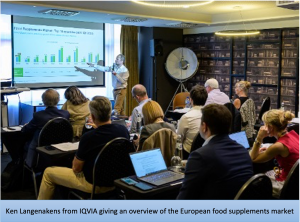
.
The day began with a detailed market data overview of the food supplement sector in Europe, presented by Ken Langenakens from IQVIA. This presentation set the tone for the discussions, highlighting the sector’s current status and future potential.
.
.
.
MEP Pascal Arimont’s Keynote
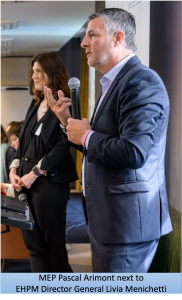
A significant highlight of the event was the keynote speech by MEP Pascal Arimont, recently re-elected to the European Parliament. Arimont emphasised the crucial role of the European food supplements sector, which predominantly consists of responsible small and medium-sized enterprises (SMEs) that contribute to employment and the EU economy.
Arimont stressed the necessity of addressing the regulatory challenges facing the sector in the upcoming EU mandate, such as the ‘on-hold’ botanical health claims and the setting of maximum levels for vitamins and minerals, to ensure a level playing field for economic operators while enabling innovation.
.
Panel discussion: The upcoming EU mandate: Priorities, Regulatory Challenges for the food supplement sector in Europe

.
Following Arimont’s address, Catherine Feore from Euractiv moderated a panel discussion on the future of the food supplements sector. The panel featured representatives from various stakeholders, including Antonio De Carluccio from Consumers’ Safe Food Advocacy Europe, and industry representatives Saskia Geurts from NPN, Valerie Vercammen from Be-sup, and Livia Menichetti from EHPM.
.
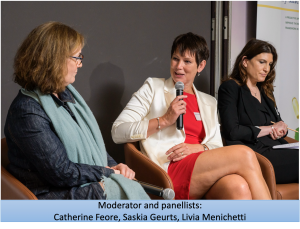 Livia Menichetti, Director-General of EHPM, provided an overview of the EHPM Manifesto 2024-2029. She elaborated on the manifesto’s six policy asks, such as EHPM’s graded approach to the ‘on-hold’ botanical health claims, the EHPM model for setting maximum levels for vitamins and minerals, and the EHPM probiotics paper. Menichetti also highlighted other tools EHPM has developed to help companies enhance their standards and procedures, including the third edition of the EHPM Quality Guide, the EHPM Nutrivigilance Paper, and the EHPM Probiotics Guidelines.
Livia Menichetti, Director-General of EHPM, provided an overview of the EHPM Manifesto 2024-2029. She elaborated on the manifesto’s six policy asks, such as EHPM’s graded approach to the ‘on-hold’ botanical health claims, the EHPM model for setting maximum levels for vitamins and minerals, and the EHPM probiotics paper. Menichetti also highlighted other tools EHPM has developed to help companies enhance their standards and procedures, including the third edition of the EHPM Quality Guide, the EHPM Nutrivigilance Paper, and the EHPM Probiotics Guidelines.
.
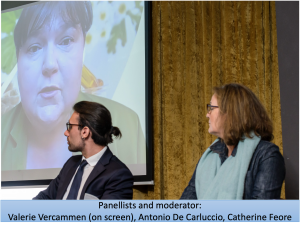 Antonio De Carluccio and the other panellists exchanged views on the necessity of policies that inform and empower consumers to make informed decisions about health, food and nutrition. This represents a crucial meeting point between consumers and industry representatives. The EHPM manifesto, in fact, calls for guiding principles to ensure that upcoming EU policy initiatives contribute to public health goals, empower consumers, and unlock the potential of the European food supplement sector.
Antonio De Carluccio and the other panellists exchanged views on the necessity of policies that inform and empower consumers to make informed decisions about health, food and nutrition. This represents a crucial meeting point between consumers and industry representatives. The EHPM manifesto, in fact, calls for guiding principles to ensure that upcoming EU policy initiatives contribute to public health goals, empower consumers, and unlock the potential of the European food supplement sector.
.
Saskia Geurts, NPN Director, highlighted the challenges posed by the so-called ‘influencer economy’ and presented a promising self-regulatory approach already tested by NPN and other stakeholders in the Netherlands. Valerie Vercammen, Be-sup Managing Director, brought the point of view of Belgian operators and also addressed one of the hottest topics, namely the European Commission’s restrictive approach to the use of the term ‘probiotics’ and the possible solid and practical ways forward.
.
Launch of EHPM Probiotics Guidelines
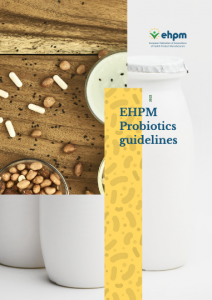 The event continued with the launch of the ‘EHPM Probiotics Guidelines’ and of the ‘EHPM Position Paper for a harmonised EU approach to the use of the term probiotics’.
The event continued with the launch of the ‘EHPM Probiotics Guidelines’ and of the ‘EHPM Position Paper for a harmonised EU approach to the use of the term probiotics’.
The ‘EHPM probiotics guidelines’, presented by Laura Jost (LHS), aims to define guidelines for a practical, reliable and safe use of probiotics in food supplements. They provide recommendations on what constitutes probiotic microorganisms: strain characterisation, safety, viability, manufacturing practices and labelling of food supplements containing probiotics.
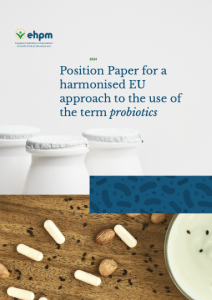 The ‘EHPM Position Paper for a harmonised EU approach to the use of the term probiotics’, presented by Valerie Vercammen (Be-sup), argues EHPM policy ask to adopt the ‘category approach’ to the use of the term probiotics and is meant to be a visual and practical public affairs tool for EHPM and its members towards European and National Authorities.
The ‘EHPM Position Paper for a harmonised EU approach to the use of the term probiotics’, presented by Valerie Vercammen (Be-sup), argues EHPM policy ask to adopt the ‘category approach’ to the use of the term probiotics and is meant to be a visual and practical public affairs tool for EHPM and its members towards European and National Authorities.
Both documents are result of three years of work of the EHPM Working Group on Probiotics, which gathers experts from the food supplements sector to proactively develop balanced and practical proposals to create a labelling environment that consumers can trust, allowing them to make informed choices about the products they purchase and consume.
More information on the two probiotics documents is available here.
.
Partners’ and members’ contributions
The event continued with presentations and exchanges with Simon Pettman and Cynthia Rousselot from the International Alliance of Dietary/Food Supplement Associations (IADSA), who presented the IADSA guidelines on influencers and marketing, offering valuable insights for the industry. They were followed by Nicola Scocchi and Luke Richer from Fourtold, who presented the results and possible scenarios after the European elections in June 2024. In this context, EHPM Director General Livia Menichetti presented EHPM Public Affairs Strategy: Strategic actions for immediate engagement with new European Parliament and European Commission. Finally, the Annual General Meeting was closed, as is tradition, by presentations from EHPM members. On this occasion, Martin Last, HFMA Director General, gave an update on the UK and Sukhbinder Gill, IHTA new Secretary General, presented his mandate.
.
EHPM 2024-2029 Manifesto
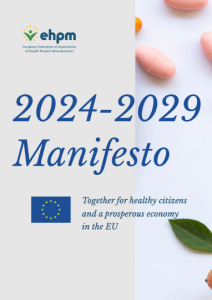 The fil rouge of the event was the ‘EHPM 2024-2029 Manifesto: Together for healthy citizens and a prosperous economy in the EU’. The manifesto is a comprehensive call to action aimed at the European Union. It urges the EU to recognize food supplements as essential allies for European citizens’ health and to promote policies that empower consumers and facilitate the growth of the food supplement sector.
The fil rouge of the event was the ‘EHPM 2024-2029 Manifesto: Together for healthy citizens and a prosperous economy in the EU’. The manifesto is a comprehensive call to action aimed at the European Union. It urges the EU to recognize food supplements as essential allies for European citizens’ health and to promote policies that empower consumers and facilitate the growth of the food supplement sector.
The manifesto outlines six specific policy asks, including promoting a fair, practical, and scientifically sound model for setting maximum levels for vitamins and minerals; creating legal certainty on what constitutes a novel food; and making proportionate risk management decisions under Article 8 of Regulation 1925/2006.
More information on the Manifesto is available here.
.
Conclusion
The EHPM Annual Members’ Meeting was a significant step towards addressing the regulatory challenges faced by the European food supplement sector. The event underscored the sector’s importance to the EU economy and public health, and the EHPM Manifesto 2024-2029 laid out a clear path forward. By promoting cooperation between institutions and stakeholders, EHPM aims to support the creation a healthier and more prosperous Europe.
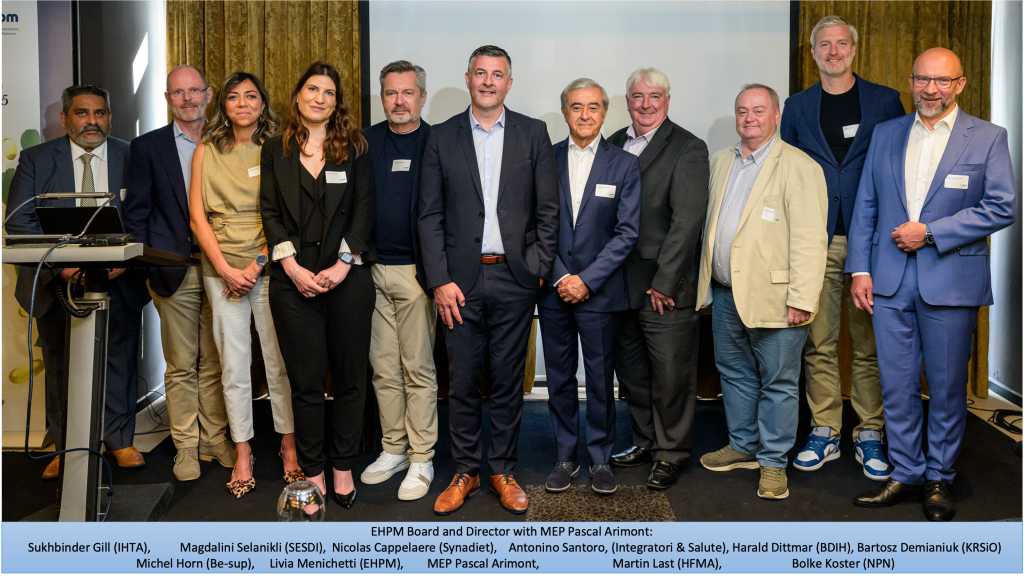
As the EU prepares for the next mandate, it is crucial to recognize the vital role of food supplements in supporting citizens’ health and well-being. Empowering consumers with accurate information and ensuring a fair regulatory framework will enable the continued growth of the European food supplement sector, benefiting both the economy and public health.
To see more:
The photos of the event are accessible here



